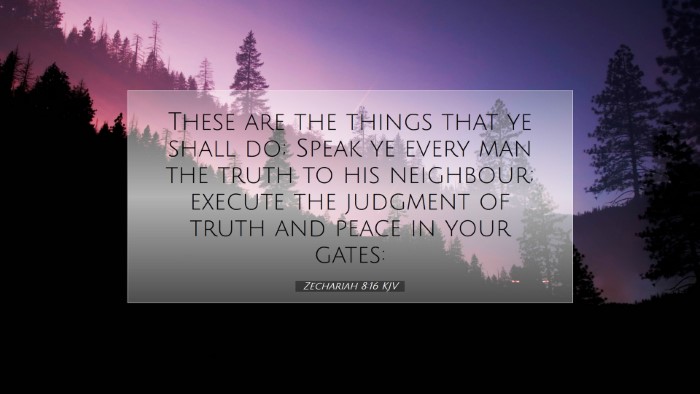Commentary on Zechariah 8:16
Zechariah 8:16 states: "These are the things that you shall do: Speak the truth to one another; render in your gates judgments that are true and make for peace." This verse encapsulates profound ethical guidance that resonates deeply with the theological tenets of justice, honesty, and communal harmony. Below, we explore the insights from esteemed public domain commentaries to provide a robust understanding of this passage.
Contextual Background
Understanding Zechariah's prophetic message requires an appreciation of the historical context of Israel’s return from Babylonian exile. After a period of instability and oppression, the Jewish people are encouraged to rebuild both their community and their relationship with God. The call to ethical behavior, particularly in the realm of speech and governance, serves as both directive and promise of restoration.
Insights from Matthew Henry
According to Matthew Henry, this passage illustrates a fundamental aspect of community life: the necessity of speaking truthfully. He emphasizes that honesty in communication is pivotal for the sustenance of trust and integrity within a society. Henry points out that when individuals commit themselves to the truth, it fosters a climate conducive to peace and mutual respect.
Additionally, Henry elaborates on the directive to render true judgments in the gates, which reflects the significance of justice in public life. The gates of a city represented its social and judicial centers during Zechariah’s time. Therefore, administering justice with accuracy and fairness is not merely a civic duty but a divine expectation that enhances communal welfare.
Insights from Albert Barnes
Albert Barnes provides a complementary perspective, specifically focusing on the implications of vibrant communal relationships rooted in truth. He notes that the exhortation to speak truthfully encompasses not only verbal honesty but also integrity in intentions. Barnes correlates these principles with the ethical teachings found in the New Testament, notably emphasizing that the character of one’s speech reflects the state of the heart.
Barnes further illustrates that the "gates" symbolize the bounds of both civil governance and moral accountability. In a society where judgment is rendered based on truth, the outcomes invariably lead to peace, as mutual understanding and respect counteract strife. He concludes that the wisdom demonstrated in these practices stems from a deeper reliance on God’s truth, showcasing the interrelation between divine law and societal health.
Insights from Adam Clarke
Adam Clarke provides an exegetical analysis by examining the Hebrew terms used in this passage, bringing forth nuanced meanings. His interpretation highlights the significance of the terms "truth" and "peace," indicating that they are not merely personal virtues but foundational elements for societal structure. Clarke emphasizes that the prophetic call is a summons to righteousness that extends beyond personal conduct, challenging the leaders and individuals of the community to embody these traits actively in public life.
Moreover, Clarke reiterates the holistic vision of restoration presented in Zechariah, suggesting that such transformation begins with the earnest commitment to truthfulness among community members. He asserts that peace cannot prevail where injustice and dishonesty exist, thereby rooting the prophetic exhortation in the ethical imperative of mutual accountability and integrity.
Theological Implications
Zechariah 8:16 has significant theological ramifications that extend beyond its immediate historical context. The ethical teachings encapsulated in this verse align with the broader scriptural narrative advocating for justice, mercy, and truth as essential components of a faithful community.
Ethics of Communication
The call to "speak the truth to one another" serves as a divine command that encourages authentic communication among believers. Both Henry and Barnes reinforce the idea that such truthfulness is intrinsic to a healthy community reflective of God’s character. The insistence on honesty echoes the fundamental biblical principle that God Himself is truth (John 14:6), and therefore, His followers are called to emulate this attribute.
Justice as a Divine Mandate
The instruction to "render in your gates judgments that are true" not only emphasizes the idea of accurate and fair adjudication but also conceives justice as a sacred duty. Clarke connects this mandate to God's overarching moral order, suggesting that any deviation leads to societal decay. Thus, governments and leaders within the church and society are called to uphold justice, mirroring God’s righteousness and fostering environments where peace can flourish.
Promoting Peace within Community
The ultimate goal of speaking truth and delivering just judgments is the promotion of peace, an outcome that is vital for communal life. As echoed in the commentaries, peace is not merely the absence of conflict but the active presence of righteousness and justice—qualities that establish a flourishing community life. The internal transformation of individuals through adherence to God’s truth contributes decisively to establishing harmony among others.
Conclusion
Zechariah 8:16 serves as a compelling reminder of the ethical and moral responsibilities that believers hold within their communities. The collective insights from Matthew Henry, Albert Barnes, and Adam Clarke highlight the rich tapestry of truth, justice, and peace as anchors for communal life. It is through these principles that a society can genuinely reflect the heart of God, paving the way for restoration and abundant life.


